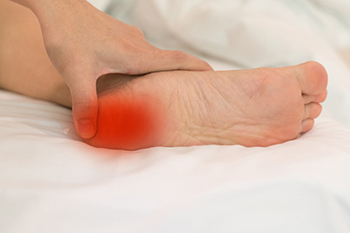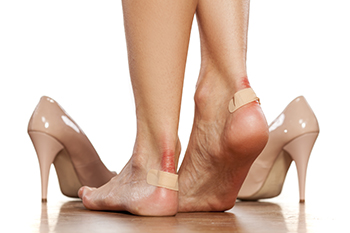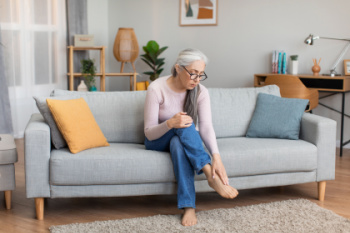Items filtered by date: April 2024
What is Sever’s Disease?

Sever's disease, also known as calcaneal apophysitis, is a common childhood condition characterized by heel pain caused by inflammation of the growth plate in the heel bone. It typically affects physically active children and adolescents, particularly those experiencing growth spurts during puberty. The condition occurs due to repetitive stress or tension on the growth plate and can be seen in active children involved in sports with running or jumping. Radiographic tests, such as X-rays or MRI scans, may be conducted to diagnose Sever's disease, ruling out other potential causes of heel pain and assessing the extent of inflammation or bone changes. If your child complains of heel pain, or if you notice them limping, it is suggested that you schedule an appointment with a podiatrist to help manage this condition.
Sever's disease often occurs in children and teens. If your child is experiencing foot or ankle pain, see Henrietta Obidigbo, DPM from Jersey Foot and Ankle Clinic. Our doctor can treat your child’s foot and ankle needs.
Sever’s Disease
Sever’s disease is also known as calcaneal apophysitis, which is a medical condition that causes heel pain I none or both feet. The disease is known to affect children between the ages of 8 and 14.
Sever’s disease occurs when part of the child’s heel known as the growth plate (calcaneal epiphysis) is attached to the Achilles tendon. This area can suffer injury when the muscles and tendons of the growing foot do not keep pace with bone growth. Therefore, the constant pain which one experiences at the back of the heel will make the child unable to put any weight on the heel. The child is then forced to walk on their toes.
Symptoms
Acute pain – Pain associated with Sever’s disease is usually felt in the heel when the child engages in physical activity such as walking, jumping and or running.
Highly active – Children who are very active are among the most susceptible in experiencing Sever’s disease, because of the stress and tension placed on their feet.
If you have any questions, please feel free to contact our office located in Freehold, NJ . We offer the newest diagnostic and treatment technologies for all your foot and ankle injuries.
Foot Pain Management With Custom Orthotics

Custom orthotics offer significant benefits in managing bunions, hammertoes, and Achilles tendinosis by controlling pain and slowing the progression of deformities. Specifically designed to fit the unique contours of an individual's foot, these orthotic devices provide support and stability, redistributing pressure away from problem areas. For bunions, orthotics can alleviate discomfort by cushioning the joint and preventing further misalignment. In the case of hammertoes, custom orthotics help stabilize flexible deformities, promoting proper alignment and relieving pressure on the affected toes. Additionally, orthotics can address Achilles tendinosis by reducing strain on the tendon and promoting optimal foot positioning during movement. By providing support and alignment, custom orthotics not only manage symptoms but also help prevent the worsening of these conditions, allowing individuals to maintain an active lifestyle with reduced pain and improved function. If you have foot pain from one of the above-mentioned conditions, it is suggested that you schedule an appointment with a podiatrist to discuss how custom-made orthotics can help you.
If you are having discomfort in your feet and would like to try orthotics, contact Henrietta Obidigbo, DPM from Jersey Foot and Ankle Clinic. Our doctor can provide the care you need to keep you pain-free and on your feet.
What Are Orthotics?
Orthotics are inserts you can place into your shoes to help with a variety of foot problems such as flat feet or foot pain. Orthotics provide relief and comfort for minor foot and heel pain but can’t correct serious biomechanical problems in your feet.
Over-the-Counter Inserts
Orthotics come in a wide variety of over-the-counter inserts that are used to treat foot pain, heel pain, and minor problems. For example, arch supports can be inserted into your shoes to help correct overarched or flat feet, while gel insoles are often used because they provide comfort and relief from foot and heel pain by alleviating pressure.
Prescription Orthotics
If over-the-counter inserts don’t work for you or if you have a more severe foot concern, it is possible to have your podiatrist prescribe custom orthotics. These high-quality inserts are designed to treat problems such as abnormal motion, plantar fasciitis, and severe forms of heel pain. They can even be used to help patients suffering from diabetes by treating foot ulcers and painful calluses and are usually molded to your feet individually, which allows them to provide full support and comfort.
If you are experiencing minor to severe foot or heel pain, it’s recommended to speak with your podiatrist about the possibilities of using orthotics. A podiatrist can determine which type of orthotic is right for you and allow you to take the first steps towards being pain-free.
If you have any questions please contact our office located in Freehold, NJ . We offer the newest diagnostic and treatment technologies for all your foot and ankle needs.
Let the Expert Treat Your Ingrown Toenails
All About Foot Blisters

Foot blisters, fluid-filled sacs on the skin's surface, often result from friction, moisture, or wearing poorly fitting footwear. They commonly occur in areas prone to rubbing or pressure, like heels or toes. People who have diabetes or peripheral neuropathy may not notice a blister has formed, due to a lack of sensation. Complications may include infection if not properly cared for, particularly in those with weakened immune systems. Prevention includes wearing well-fitting shoes, using moisture-wicking socks, and applying lubricants or blister pads. If blisters persist or become infected, it is suggested that you schedule an appointment with a podiatrist for proper assessment and safe treatment, which could involve draining large blisters or prescribing antibiotics for infections.
Blisters are prone to making everyday activities extremely uncomfortable. If your feet are hurting, contact Henrietta Obidigbo, DPM of Jersey Foot and Ankle Clinic. Our doctor can provide the care you need to keep you pain-free and on your feet.
Foot Blisters
Foot blisters develop as a result of constantly wearing tight or ill-fitting footwear. This happens due to the constant rubbing from the shoe, which can often lead to pain.
What Are Foot Blisters?
A foot blister is a small fluid-filled pocket that forms on the upper-most layer of the skin. Blisters are filled with clear fluid and can lead to blood drainage or pus if the area becomes infected.
How Do Blisters Form?
Blisters on the feet are often the result of constant friction of skin and material, usually by shoe rubbing. Walking in sandals, boots, or shoes that don’t fit properly for long periods of time can result in a blister. Having consistent foot moisture and humidity can easily lead to blister formation.
Prevention & Treatment
It is important to properly care for the affected area in order to prevent infection and ease the pain. Do not lance the blister and use a Band-Aid to provide pain relief. Also, be sure to keep your feet dry and wear proper fitting shoes. If you see blood or pus in a blister, seek assistance from a podiatrist.
If you have any questions, please feel free to contact our office located in Freehold, NJ . We offer the newest diagnostic and treatment technologies for all your foot care needs.
Managing Aging Feet

As individuals age, various changes occur in the feet that can affect mobility and comfort. Reduced flexibility, decreased muscle mass, and thinning fat pads are common occurrences. These changes can lead to issues such as stiffness, difficulty walking, and increased risk of foot injuries. To mitigate these effects, incorporating foot exercises, stretching routines, and maintaining a healthy weight can help preserve foot health and function. Wearing supportive footwear with cushioning and adequate arch support can also alleviate discomfort and reduce the risk of developing foot problems. Consulting a podiatrist is beneficial for personalized foot care as this medically trained foot doctor can provide tailored recommendations and interventions. If you are experiencing foot problems due to aging, and want to preserve the health of your feet, it is suggested that you schedule an appointment with a podiatrist for an assessment and advice on how to best care for your feet.
If you need your feet checked, contact Henrietta Obidigbo, DPM of Jersey Foot and Ankle Clinic. Our doctor will attend to all of your foot and ankle needs and provide you with quality treatment.
Geriatrics and Podiatry
When people age, some common issues that may occur are bone density loss, dry skin, poor circulation, and rough brittle nails. These issues may also affect your foot health if the necessary steps are not taken to alleviate the problems.
It is important to take care of your feet because feet that are injured or diseased can affect your overall health. Having painful feet hinders your ability to do daily activities or may decrease your willingness to do the things that you need to do.
Visiting Your Geriatrician
As we age, health problems become more likely, so it is essential to visit your doctor for check-ups to ensure that you are doing the best you can to take care of your health. It is recommended to check your feet frequently for any possible cuts, bruises, swelling, corns or any other irregularities.
Taking Care of Elderly Feet
Cracked or dry feet can be treated by applying moisturizer often. It is also important not to wear old socks because the older the sock is, the higher the possibility there will be that there is bacteria there. Wear fresh socks and make sure they fit properly.
Proper foot health means that you can have a more active lifestyle and you will not be bogged down by pain. Foot health also leads to good circulation, which is paramount for overall health.
If you have any questions, please feel free to contact our office located in Freehold, NJ . We offer the newest diagnostic tools and technology to treat your foot and ankle needs.
Causes and Treatment of Plantar Warts

Plantar warts are benign growths caused by the human papillomavirus, or HPV, infecting the outer layer of the skin on the soles of the feet. They often appear as small, rough lesions with tiny black dots, known as wart seeds. These warts thrive in warm, moist environments such as showers, locker rooms, and swimming pools, making them common among barefoot individuals. Unfortunately, there is no singular quick-fix cure for plantar warts, as treatment methods vary and can take time to be effective. Diagnosis typically involves a visual examination by a podiatrist, sometimes supplemented by a biopsy or other tests. It is important to note that plantar warts can be mistaken for other conditions like calluses or corns. Prevention involves keeping feet clean and dry, avoiding walking barefoot in public areas, and wearing protective footwear, especially in communal spaces. If you or your child has a plantar wart, it is suggested that you schedule an appointment with a podiatrist for a proper diagnosis and appropriate treatment.
Plantar warts can be very uncomfortable. If you need your feet checked, contact Henrietta Obidigbo, DPM from Jersey Foot and Ankle Clinic. Our doctor will assist you with all of your foot and ankle needs.
About Plantar Warts
Plantar warts are the result of HPV, or human papillomavirus, getting into open wounds on the feet. They are mostly found on the heels or balls of the feet.
While plantar warts are generally harmless, those experiencing excessive pain or those suffering from diabetes or a compromised immune system require immediate medical care. Plantar warts are easily diagnosed, usually through scraping off a bit of rough skin or by getting a biopsy.
Symptoms
- Lesions on the bottom of your feet, usually rough and grainy
- Hard or thick callused spots
- Wart seeds, which are small clotted blood vessels that look like little black spots
- Pain, discomfort, or tenderness of your feet when walking or standing
Treatment
- Freezing
- Electric tool removal
- Laser Treatment
- Topical Creams (prescription only)
- Over-the-counter medications
To help prevent developing plantar warts, avoid walking barefoot over abrasive surfaces that can cause cuts or wounds for HPV to get into. Avoiding direct contact with other warts, as well as not picking or rubbing existing warts, can help prevent the further spread of plantar warts. However, if you think you have developed plantar warts, speak to your podiatrist. He or she can diagnose the warts on your feet and recommend the appropriate treatment options.
If you have any questions please feel free to contact our office located in Freehold, NJ . We offer the newest diagnostic and treatment technologies for all your foot and ankle needs.





